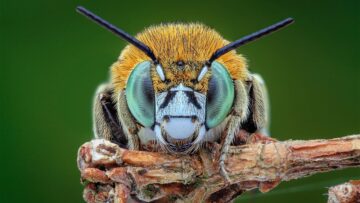Dan Falk in Quanta Magazine:
 In 2022, researchers at the Bee Sensory and Behavioral Ecology Lab at Queen Mary University of London observed bumblebees doing something remarkable: The diminutive, fuzzy creatures were engaging in activity that could only be described as play. Given small wooden balls, the bees pushed them around and rotated them. The behavior had no obvious connection to mating or survival, nor was it rewarded by the scientists. It was, apparently, just for fun.
In 2022, researchers at the Bee Sensory and Behavioral Ecology Lab at Queen Mary University of London observed bumblebees doing something remarkable: The diminutive, fuzzy creatures were engaging in activity that could only be described as play. Given small wooden balls, the bees pushed them around and rotated them. The behavior had no obvious connection to mating or survival, nor was it rewarded by the scientists. It was, apparently, just for fun.
The study on playful bees is part of a body of research that a group of prominent scholars of animal minds cited today, buttressing a new declaration that extends scientific support for consciousness to a wider suite of animals than has been formally acknowledged before. For decades, there’s been a broad agreement among scientists that animals similar to us — the great apes, for example — have conscious experience, even if their consciousness differs from our own. In recent years, however, researchers have begun to acknowledge that consciousness may also be widespread among animals that are very different from us, including invertebrates with completely different and far simpler nervous systems.
More here.
